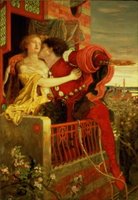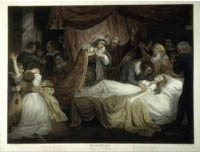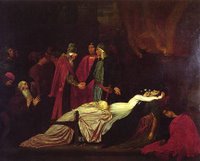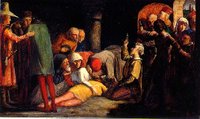Please listen to Henry Mancini's "Romeo & Juliet"
 while going at it, to heighten your sense of sadness.
while going at it, to heighten your sense of sadness.[tragedy in art and soliloquy: part I]
... For never was a story of more woe
Than this of Juliet and her Romeo.
Romeo and Juliet. Aaah... young love! And how it torments! For the very young, very naive and very

 beautiful Juliet, "It is too rash, too unadvised, too sudden..." and for the young, passionate Romeo, "all this is but a dream". The two young lovers get trapped and torn between two warring families in Verona, Montague and Capulet. "My only love sprung from my only hate", mentions Juliet.
beautiful Juliet, "It is too rash, too unadvised, too sudden..." and for the young, passionate Romeo, "all this is but a dream". The two young lovers get trapped and torn between two warring families in Verona, Montague and Capulet. "My only love sprung from my only hate", mentions Juliet.This saga of Shakespeare's 'Lyrical Period' is merciless, and the two love-birds are doomed from the beginning. "Alack, there lies more peril in thine eye..." The impending tragedy is obvious.
ACT III, Scene V: images by Dicksee [top-left] and Brown [top-right]
 ACT IV, Scene IV left image by John Opie
ACT IV, Scene IV left image by John Opie No happy endings. Everyone dies at the end. Mercutio dies, 'accidentally and dramatically', in a duel between Romeo [a Montague] and Tybalt [a Capulet and Juliet's cousin], but had enough time to wish A plague o' both your houses! right before he passed away. Romeo slays Tybalt, and as a punishment, goes into exile. Juliet refuses to marry Paris, as she is secretly betrothed to her Romeo already, and goes into mourning. Herbal medicines and potions come to the rescue. Juliet gulps down some to go into a comma, so she can escape away with Romeo after she is taken to the family crypt. Misinformed about the staged death, a grief-stricken Romeo haggles with the Apothecary [There is thy gold, worse poison to men's souls] to buy some poison, kills Paris on the way, and drinks the poison to die on Juliet's lap. O true Apocotheary! Thy drugs are quick! Thus with a kiss I die. Juliet wakes up, sees the dead, and stabs herself with his dagger. Yea, noise? then I'll be brief. O happy dagger! This is thy sheath; there rust, and let me die. And the two lovers lie dead together.
Surprisingly, it is not considered one of Shakepeare's 'great tragedies' like Macbeth or Hamlet. The tragedy stems more from mistiming, or misfortune, than individual flaws of the two lovers. The long-running feud ends at the price of the two lovers' lives.

 ACT V, Scene III: Romeo at Juliet's Deathbed by Füssli ;
ACT V, Scene III: Romeo at Juliet's Deathbed by Füssli ; 
The Reconciliation of the Montagues and Capulets by Leighton ; Death of Romeo and Juliet by Millais;
No comments:
Post a Comment